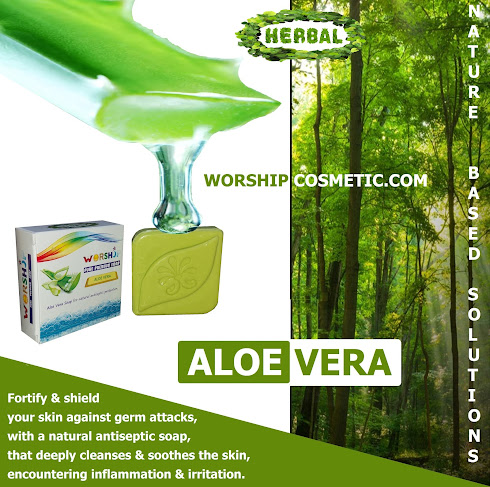Aloe Vera Soap
ALOE VERA
Aloe Vera is a succulent plant often found in tropical climates,
with its use recorded as far back as Egyptian times, topically and orally. Its
extracts are often used in cosmetics and can be found in everything from
fragrances to moisturizer.
Aloe Vera is a popular thick, short-stemmed medicinal plant that
stores water in its leaves and have been used for thousands of years,
especially best known for treating skin injuries.
An evergreen perennial, it originates from the Arabian
Peninsula, but grows wild in tropical, semi-tropical, and arid climates around
the world. It is cultivated for commercial products, mainly as a topical
treatment used over centuries. It is used in many consumer products, including
beverages, skin lotion, cosmetics, ointments or in the form of gel for minor
burns and sunburns.
Its 12 to 19 inches long thick, pointed and fleshy green leaves,
contains a slimy tissue that stores water & filled with tissue gel, which
is used in dozens of medicinal products worldwide.
The gel contains most of the beneficial bioactive compounds in
the plant, including vitamins, minerals, amino acids, and powerful antioxidants
belonging to a large family of substances known as polyphenols.
Aloe Vera is known for its antibacterial, antiviral, and
antiseptic properties that help in healing wounds and treating skin problems
like sores, burns & sunburns.
Two substances from Aloe Vera, namely a clear gel and its yellow
latex, are used to manufacture topical medications for skin conditions, such as
burns, wounds, frostbite, rashes, psoriasis, cold sores, or dry skin. The latex
of Aloe Vera leaf is a sticky yellow residue, present just under the skin of
the leaf, having aloin / barbaloin, as a vital source of laxative effects.
Thee topical Aloe Vera gel can slow aging of the skin, whereby
it increases collagen production and improves skin elasticity over a period of
time. It helps the skin to retain moisture and improve skin integrity, which effectively
encounters dry skin conditions.
Aloe Vera is effective in killing the plaque-producing bacterium
Streptococcus mutans in the mouth, as well as the yeast Candida albicans. Aloe Vera
gel not only accelerated the healing of mouth ulcers, it also reduced the pain
associated with them.
Aloe vera leaves contain phytochemicals under study for possible
bioactivity, such as acetylated mannans, polymannans, anthraquinone
C-glycosides, anthrones, and other anthraquinones, such as emodin and various
lectins. Aloe Vera gel is used in many skin products, as its plant extract has
antibacterial and anti-inflammatory properties, which has led to its use in
treating acne.
Aloe Vera is used on facial tissues where it is promoted as a
moisturizer and anti-irritant to reduce chafing of the nose. Cosmetic companies
commonly add sap or other derivatives from Aloe Vera to products such as
makeup, tissues, moisturizers, soaps, sunscreens, incense, shaving cream, or
shampoos, due to its "moisturizing emollient effect".
Aloe Vera contains glucomannan, a compound with regenerative
properties, which is highly effective in encountering sunburns, potentially
reducing wound recovery times, infections and skin redness. Aloe Vera gel
appeared to be most effective on first and second-degree burns.
Thanks to its natural anti-inflammatory properties, Aloe Vera
also serves as an excellent acne treatment, whether it’s applied to pimples or
to general areas of redness and irritation, Aloe Vera has been found to soothe
and diminish the appearance and prominence of acne and even acne scars.
Aloe Vera has the ability to reduce prostaglandin E2 production,
these are lipids that trigger an inflammatory response in the sebaceous glands,
which are attached to hair follicles and produce oil. The less inflammation in
the sebaceous glands, the less inflammatory acne.
Aloe Vera has a high number of mucopolysaccharides, a hydrating
molecule that keeps moisture in the skin. Hyaluronic acid, a popular skin-care
ingredient noted for its hydrating and anti-aging properties, is another
mucopolysaccharide.
Aloe Vera activates fibroblasts (a type of cell found in
connective tissue), which ramp up production of collagen and elastin fibers,
resulting into tighter-looking skin and fewer wrinkles.
Aloe Vera gel’s anti-inflammatory effects have also been shown
to be beneficial in the treatment of psoriasis and eczema, whereby it reduces
redness and scaling.
With its moisturizing & anti-aging properties, Aloe Vera is
an important step in your beauty regime because it traps water in the skin, helping
it to appear more youthful.
COURTSEY: WORSHIPCOSMETIC.COM




Comments
Post a Comment